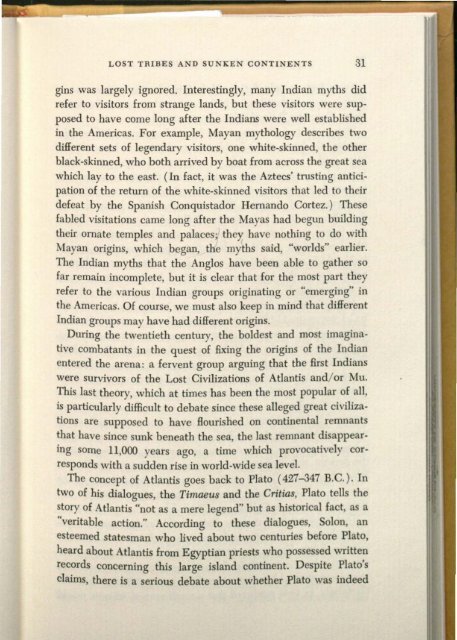You also want an ePaper? Increase the reach of your titles
YUMPU automatically turns print PDFs into web optimized ePapers that Google loves.
LOST TRIBES AND SUNKEN CONTINENTS 31<br />
gins was largely ignored. Interestingly, many <strong>Indian</strong> myths did<br />
refer to visitors from strange l<strong>and</strong>s, but <strong>the</strong>se visitors were supposed<br />
to have come long after <strong>the</strong> <strong>Indian</strong>s were well established<br />
in <strong>the</strong> Americas. For example, Mayan mythology describes two<br />
diHerent sets <strong>of</strong> legendary visitors, one white-skinned, <strong>the</strong> o<strong>the</strong>r<br />
black-skinned, who both arrived by boat from across <strong>the</strong> great sea<br />
which lay to <strong>the</strong> east. (In fact, it was <strong>the</strong> Aztecs' trusting anticipation<br />
<strong>of</strong> <strong>the</strong> return <strong>of</strong> <strong>the</strong> white-skinned visitors that led to <strong>the</strong>ir<br />
defeat by <strong>the</strong> Spanish Conquistador Hern<strong>and</strong>o Cortez.) <strong>The</strong>se<br />
fabled visitations came long after <strong>the</strong> Mayas had begun building<br />
<strong>the</strong>ir ornate temples <strong>and</strong> palaces; <strong>the</strong>y have nothing to do with<br />
Mayan origins, which began, <strong>the</strong> myths said, "worlds" earlier.<br />
<strong>The</strong> <strong>Indian</strong> myths that <strong>the</strong> Anglos have been able to ga<strong>the</strong>r so<br />
far remain incomplete, but it is clear that for <strong>the</strong> most part <strong>the</strong>y<br />
refer to <strong>the</strong> various <strong>Indian</strong> groups originating or "emerging" in<br />
<strong>the</strong> Americas. Of course, we must also keep in mind that diHerent<br />
<strong>Indian</strong> groups may have had different origins.<br />
During <strong>the</strong> twentieth century, <strong>the</strong> boldest <strong>and</strong> most imaginative<br />
combatants in <strong>the</strong> quest <strong>of</strong> fixing <strong>the</strong> origins <strong>of</strong> <strong>the</strong> <strong>Indian</strong><br />
entered <strong>the</strong> arena: a fervent group arguing that <strong>the</strong> first <strong>Indian</strong>s<br />
were survivors <strong>of</strong> <strong>the</strong> Lost Civilizations <strong>of</strong> Atlantis <strong>and</strong>/ or Mu.<br />
This last <strong>the</strong>ory, which at times has been <strong>the</strong> most popular <strong>of</strong> ail,<br />
is particularly difficult to debate since <strong>the</strong>se alleged great civilizations<br />
are supposed to have flourished on continental remnants<br />
that have since sunk beneath <strong>the</strong> sea, <strong>the</strong> last remnant disappearing<br />
some 11,000 years ago, a time which provocatively corresponds<br />
with a sudden rise in world-wide sea level.<br />
<strong>The</strong> concept <strong>of</strong> Atlantis goes back to Plato (427-347 B.C.). In<br />
two <strong>of</strong> his dialogues, <strong>the</strong> Timaeus <strong>and</strong> <strong>the</strong> Critias, Plato tells <strong>the</strong><br />
story <strong>of</strong> Atlantis "not as a mere legend" but as historical fact, as a<br />
"veritable action." According to <strong>the</strong>se dialogues, Solon, an<br />
esteemed statesman who lived about two centuries before Plato,<br />
heard about Atlantis from Egyptian priests who possessed written<br />
records concerning this large isl<strong>and</strong> continent. Despite Plato's<br />
claims, <strong>the</strong>re is a serious debate about whe<strong>the</strong>r Plato was indeed


















